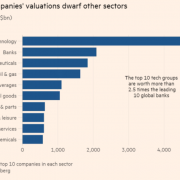Smartphones Aren't Going Away
The United States has long been the world leader in science and technology, but lately, they are falling asleep at the wheel.
At a psychological level, the feeling of threat has led to all sorts of unintended consequences, and it has been no accident we are seeing at a trade war.
The one key ingredient that has been missing is sustained investment in our research enterprise.
Without relentless investment into scientific and technological leadership, don’t expect any new breakthroughs, and the stagnation of US technology is evident in the evolution of a product that goes on sale to the consumer.
What happened to 5G? It’s been hyped for the past 3 years, but people have felt no need to upgrade for the spotty 5G that is available.
What happened to automated cars?
I thought by now, we would be able to get around with our flying cars.
What we do have are bigger iPads, faster iMacs, and the Microsoft Surface which is a tablet with an attachable keyboard.
I wouldn’t call that success.
But what the pandemic did was allow these big tech firms to get away without innovating, and I am not talking about the incremental innovation that makes a Model 3 Tesla 4% better than the prior iteration.
The hype of 10 years of digital transformation into one year has been profusely disseminated but misunderstood.
I can tell you that we didn’t experience 10 years of digital development pulled forward into 1 year.
That definitely was not the case over the past 15 months.
More accurately said, we had 10 years of expandable margin opportunities squeezed into one and the biggest beneficiary of this is the balance sheet of big tech.
What we did was give a reason for tech to not ditch this over-reliance on the smartphone which is going strong into its 13th year.
It was 2007 when Steve Jobs delivered us the iPhone and by 2008, many consumers were using it.
In 2021, the iPhone and variants still have a stranglehold on human life and the way business models are put together.
That won’t go away because of the pandemic and now these big tech behemoths have no reason to dip too far into capital expenditures.
Not only that, but they are also cutting back spend on office space and business travel too while sneakily reducing salaries of remote employees who move to cheaper cities.
In fact, the pandemic will elongate the smartphone dynasty, and any other meaningful tech has been put back on the backburner for the time being.
Then there are companies like Uber that are busy sorting out its decimated ride-sharing business before they can even dream about flying uber cars.
So, I am not surprised that the House Science Committee is taking up two bipartisan bills to try to push the agenda forward.
The need to act is best captured by two data points. First, as much as 85% of America’s long-term economic growth is due to advances in science and technology. There’s a direct connection between investment in research and development and job growth in the U.S.
Second, China increased public R&D by 56% between 2011 and 2016, but U.S. investment in the same period fell by 12% in absolute terms. China has likely surpassed the U.S. in total R&D spending and — through both investment and cyber theft — is working to overtake the U.S. as the global leader in science and technology.
America’s continued scientific leadership requires a comprehensive and strategic approach to research and development that provides long-term increased investment and stability across the research ecosystem. And it must focus on evolving technologies that are crucial to our national and economic security, like semiconductors and quantum sciences.
Now that the U.S. government has identified this issue as a national security issue, money will be thrown at the problem, but don’t expect anything to change tomorrow.
We are still a way off from forcing big tech to change their profit models and that will happen when they need to keep up with the next big thing.
There is no big next thing yet.
Until then, expect more incremental progress from your smartphone and Tesla.
It’s certainly not a bad situation to wield a smartphone that is 4% better each year or drive a Tesla that performs just a bit better as well.
Effectively, these enormous and profitable revenue models will stay in place and investors have no reason to worry about big tech moving forward.
This benefits the likes of Amazon, Tesla, Facebook, Google, Apple, and Netflix.
The only risk to U.S. tech is a threat that the U.S. government is absorbing themselves. What a great industry to be in.
Net-net, this is a great win for big tech and I don’t expect anything to drastically change, but get ready for a lot more digital ads in your daily consumption of digital content and more of the same products.






